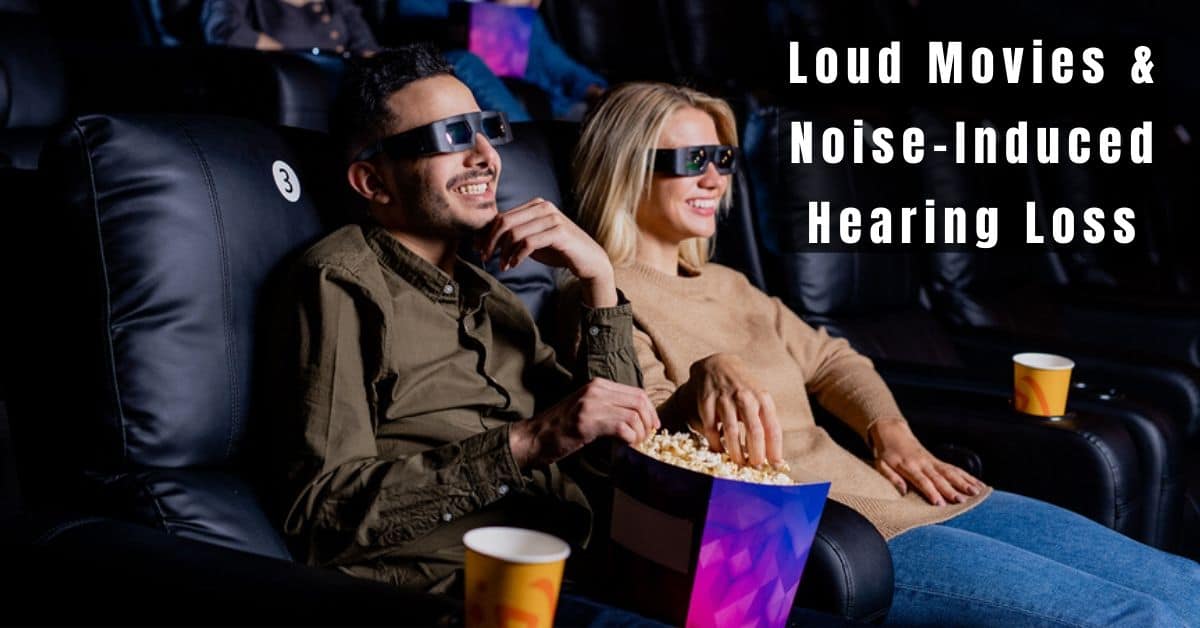There’s nothing quite like enjoying a movie night with your family, and seeing a long-anticipated film on the big screen with a bag of delicious popcorn. Seeing a movie is a great way to beat the cold in winter, and stay cool in the summer, but did you know that the movie theatre could be causing hearing loss?
What is Noise-Induced Hearing Loss?
You may think that you’re too young to have hearing loss, and that only seniors will lose their hearing. Hearing loss can occur as part of the natural aging process, but millions of Americans risk noise-induced hearing loss, or a hearing loss caused by exposure to very loud sounds. These loud noises damage the delicate cells in your ears, and when these cells are damaged, you’ll experience hearing loss. Sounds that cause hearing loss are any noises louder than 85 decibels (dB). When sounds are very loud, hearing loss can occur in just a few minutes.
Going to the Movies
Do movie theaters cause hearing loss? In creating an immersive viewing experience, theaters often turn up the volume to dangerously loud levels. For example, Storks, the animated film your children love, stays at safe levels for most of the movie, but spikes to 99 decibels during one scene. Deepwater Horizon, an action-packed film with explosions, has numerous moments where sound levels top 100, and even 104dB.
Controlling Sound Levels
There are regulations in place that govern sound levels at theaters, but these industry standards control the overall volume of a film, not the spikes in sound during loud scenes. If a film is mostly under 85 dB, the film is considered safe. However, having a few scenes of normal conversation at around 60 or 70 dB won’t undo the harm of the louder sections that can be very unsafe for your ears.
Have you ever left the movie theater with any pain in your ears, or a feeling of ringing or buzzing? Perhaps sounds around you seemed muffled for a few minutes. These are signs that the movie was too loud, and that you’ve risked your hearing health.
Testing Sound Levels
Are you worried that you won’t be able to enjoy movies in the future? One way to protect your hearing is to test the sound levels in the theater during the film. There are several free decibel reader apps for both android and iPhone users, and you’ll get a sense of the sound levels. Start testing as soon at the ads begin, and find out just how loud your movie theater is. The ads are often extremely loud, showing all the most action-packed scenes of a new blockbuster, and flooding the theater with sound affects that reach above 105dB.
Protecting Your Hearing
If you or your family is exposed to sounds over 100dB for the duration of a film, you all risk damage to the ear, could suffer from ringing in the ears, and increase your chances of noise-induced hearing loss. The best way to protect your hearing is to remove yourself from the noise. Avoid seeing very loud movies in theaters, raise your concerns with your local theater, and safeguard the hearing of everyone in your family. If there’s a film you’ve all been dying to see, go to the theater armed with earplugs, and be sure you’re wearing them during all the loudest scenes. Teach your children how to insert foam or wax earplugs correctly, and protect your hearing with ear plugs.
If you’re often at the movies, enjoy other loud leisure activities, or work in a dangerously loud environment, consider custom hearing protection that’s custom molded to your ear, and will give you the best protection. You can even get digital hearing protection that will allow you to hear safe sounds at a normal volume, but will instantly reduce any dangerously loud sounds in your environment.
My Hearing Centers
Want to learn more about loud movies and noise-induced hearing loss? Visit us today at My Hearing Centers to learn all about your hearing health. If you have a hearing loss, we’ll test your hearing and help you find the best solutions to your hearing needs. If you’re at risk of noise-induced hearing loss, we’ll make sure you have the best hearing protection to keep your hearing safe.


